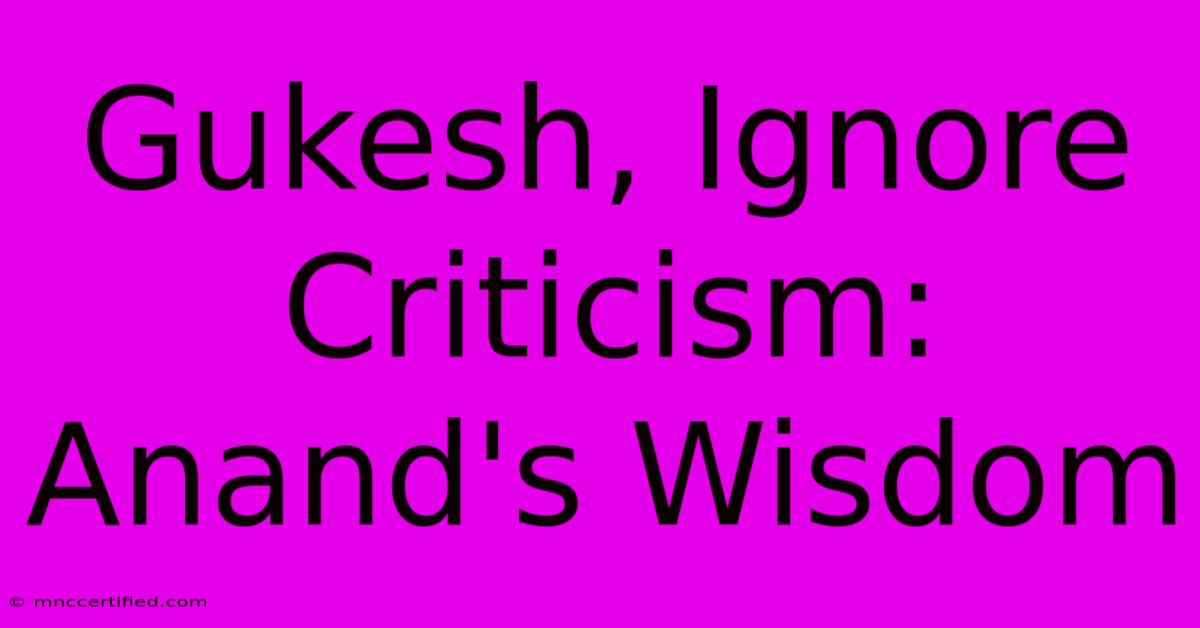Gukesh, Ignore Criticism: Anand's Wisdom

Table of Contents
Gukesh, Ignore Criticism: Anand's Wisdom – A Path to Chess Mastery
Viswanathan Anand, a legend in the world of chess, recently offered invaluable advice to the prodigious young talent, R Praggnanandhaa's younger brother, Dommaraju Gukesh: ignore the criticism. This seemingly simple piece of wisdom holds profound implications for Gukesh's development and offers a valuable lesson for aspiring chess players and high-achievers in any field. This article delves into the significance of Anand's counsel, exploring its context, implications, and broader application.
The Pressure Cooker of Young Success
Gukesh's meteoric rise in the chess world has been nothing short of spectacular. At a remarkably young age, he's achieved a Grandmaster title and consistently competes at the highest levels. This rapid ascent, however, inevitably brings intense scrutiny and, consequently, criticism. The pressure to perform, the expectations from fans and pundits, and the inherent challenges of competing against seasoned players create a challenging environment. Anand, having navigated these pressures throughout his illustrious career, understands the unique challenges faced by young prodigies.
The Importance of Mental Fortitude
Anand's advice emphasizes the importance of mental fortitude. Ignoring criticism isn't about ignoring constructive feedback entirely. Instead, it's about filtering out the noise, separating genuine, helpful analysis from unproductive negativity. Young players, particularly those under intense public pressure, can easily get bogged down by harsh critiques, losing sight of their own progress and potential. This can lead to self-doubt, anxiety, and ultimately, hinder their performance.
Anand's Legacy: More Than Just Chess Moves
Anand's guidance extends beyond the technical aspects of chess. His wisdom stems from years of experience managing the immense pressure that comes with being a world champion. He understands the psychological toll that relentless criticism can take, especially on young minds still developing their coping mechanisms. His advice isn't just about winning games; it's about cultivating a resilient mindset – a crucial component of long-term success in any competitive field.
Developing a Growth Mindset
Anand's message subtly promotes the adoption of a growth mindset. By focusing on self-improvement and learning from mistakes rather than dwelling on criticism, Gukesh can foster a more positive and productive learning environment. This approach encourages him to view setbacks as opportunities for growth, transforming criticism into fuel for his development.
Applying Anand's Wisdom Beyond Chess
The principle of selectively ignoring criticism transcends the world of chess. It’s a valuable life lesson applicable to various fields:
- Entrepreneurship: Entrepreneurs often face harsh criticism and skepticism. Focusing on the constructive feedback while filtering out negativity is crucial for building a successful business.
- Sports: Elite athletes constantly face scrutiny and public opinion. Ignoring unproductive criticism allows them to maintain focus and improve their performance.
- Arts: Artists are often vulnerable to criticism of their work. Learning to discern constructive criticism from destructive negativity can help refine their craft.
Conclusion: The Power of Selective Hearing
Viswanathan Anand's advice to Gukesh – ignore the criticism – is a powerful message not just for a young chess prodigy, but for anyone striving for excellence. It’s a call to cultivate mental resilience, adopt a growth mindset, and develop the ability to filter out unproductive noise. By focusing on self-improvement and constructive feedback, Gukesh, and others, can navigate the challenges of high achievement and ultimately reach their full potential. The legacy of Anand extends beyond his chess accomplishments, encompassing the wisdom he imparts to the next generation of chess players and high-achievers. This is a lesson worth learning and applying in all aspects of life.
Keywords: Gukesh, Viswanathan Anand, chess, criticism, mental fortitude, growth mindset, young prodigy, pressure, resilience, success, advice, learning, chess grandmaster, chess prodigy, Indian chess.

Thank you for visiting our website wich cover about Gukesh, Ignore Criticism: Anand's Wisdom. We hope the information provided has been useful to you. Feel free to contact us if you have any questions or need further assistance. See you next time and dont miss to bookmark.
Featured Posts
-
Asian Hornet Threat Uk Success
Dec 13, 2024
-
Astro Bot Game Awards 2024 Winner
Dec 13, 2024
-
Rams 49ers Game Preview And Predictions
Dec 13, 2024
-
Ranked Super League Average Attendances
Dec 13, 2024
-
Trump Taps Lake For Voice Of America
Dec 13, 2024